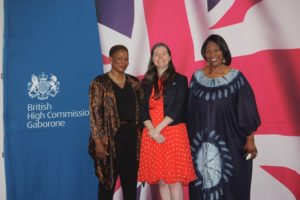
Did you know that up until 1972, if you were a woman in the British Diplomatic Service, you had to resign if you got married? Nobody is really sure how this policy came about, but thankfully wiser minds have long since prevailed. Now both male and female diplomats equally find ways to combine family and work commitments while serving their country overseas.
I am always reminded of this odd fact on International Women’s Day on 8 March. This day allows us to celebrate women’s achievements, to take stock of how things have changed, and to think about what more we can do to ensure that women and men are equal partners in society.
Promoting and protecting women’s rights is more than just a moral obligation. It is enshrined in international human rights law. It is also just good old fashioned common sense. Women participating fully in all spheres of life, including political, economic and social life – is vital to ensuring secure, stable and prosperous societies.
Botswana has a long tradition of women serving in senior positions in Government, financial and legal institutions. And it is a place where women from outside Botswana are made to feel welcome. After all, just year after the marriage ban on female diplomats was lifted, the British Government appointed its first ever female Head of Mission, Eleanor Emery. Where was she sent? Botswana!
I’ve been in Botswana for a year now, and have been inspired by the many talented, educated and confident women of all ages and backgrounds that I have met through my work. So I do find it interesting that there are so few of these women in Parliament. Women make up half the world’s population so why, in many countries do we not have equal representation? We need women in politics, not because we need them to address “women’s issues” but because we need to broaden the voices, opinions and experience of those in decision making, to better reflect the breadth and diversity of society. More inclusive policies benefit everyone.
There are often many barriers, both obvious and hidden, that prevent women entering politics. And sometimes it can simply be difficult to imagine yourself in a space where everybody already there looks, and acts, so differently to you.
To look at some of these issues, and to find ways to tackle them, the British High Commission has over the last six months been working closely with Letsema and the Westminster Foundation for Democracy. We have run a series of workshops, training close to 200 women interested in entering politics, particularly at the national level. The women who have attended the workshops have come from all political parties, all backgrounds and from every corner of the country. They are amazing, committed and with a real drive to serve their communities. They are an asset to Botswana and I hope many of them make it onto the ballot for 2019. But don’t just take my word for it – we are profiling some of these women on the Women in Politics Botswana Facebook page and sharing them on the British High Commission Facebook page – Like the pages to stay updated.
